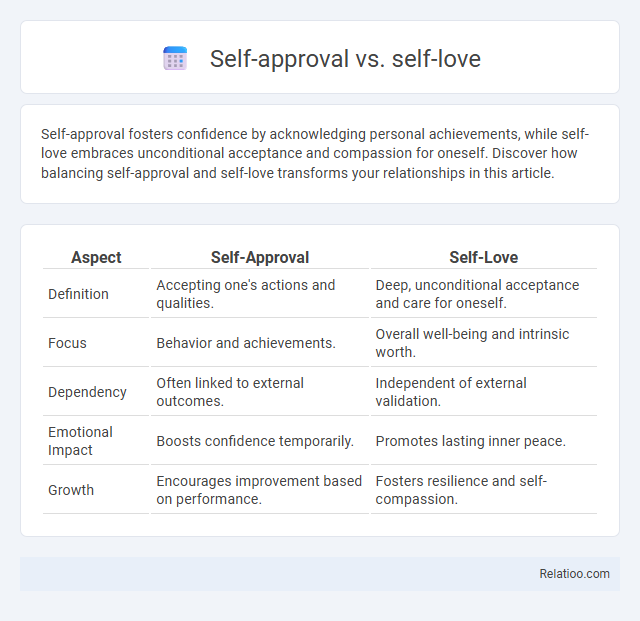Self-approval fosters confidence by acknowledging personal achievements, while self-love embraces unconditional acceptance and compassion for oneself. Discover how balancing self-approval and self-love transforms your relationships in this article.
Table of Comparison
| Aspect | Self-Approval | Self-Love |
|---|---|---|
| Definition | Accepting one's actions and qualities. | Deep, unconditional acceptance and care for oneself. |
| Focus | Behavior and achievements. | Overall well-being and intrinsic worth. |
| Dependency | Often linked to external outcomes. | Independent of external validation. |
| Emotional Impact | Boosts confidence temporarily. | Promotes lasting inner peace. |
| Growth | Encourages improvement based on performance. | Fosters resilience and self-compassion. |
Understanding Self-Approval and Self-Love
Understanding self-approval involves recognizing and accepting your own actions and qualities without harsh judgment, fostering a healthy inner validation that supports personal growth. Self-love goes deeper by cultivating a compassionate and nurturing relationship with oneself, emphasizing care, respect, and emotional well-being beyond mere acceptance. Differentiating between self-approval and self-love is essential for building authentic self-esteem and achieving long-term psychological resilience.
Key Differences Between Self-Approval and Self-Love
Self-approval centers on acknowledging and accepting one's actions or qualities as satisfactory, often linked to meeting personal or external standards. In contrast, self-love encompasses a deeper, unconditional appreciation and compassion toward oneself, embracing flaws and fostering overall well-being. The key difference lies in self-approval's conditional validation versus self-love's holistic, unwavering acceptance.
Psychological Foundations of Self-Approval
Self-approval is grounded in psychological theories emphasizing self-acceptance and internal validation, distinguishing it from self-love, which involves a broader emotional nurturing of the self, and self-esteem, often tied to external achievements. Research in cognitive-behavioral psychology highlights that self-approval fosters resilience by promoting a realistic self-assessment without harsh self-criticism. This internal endorsement is crucial for mental well-being, reducing anxiety and depressive symptoms through consistent positive self-regard.
The Essence of Self-Love
The essence of self-love lies in unconditional acceptance and genuine compassion towards oneself, transcending the external validation that self-approval seeks. Unlike self-approval, which depends on meeting certain standards or achievements, self-love embodies an intrinsic appreciation of one's worth regardless of flaws or failures. This holistic embrace fosters emotional resilience and nurtures authentic personal growth.
Benefits of Practicing Self-Approval
Practicing self-approval enhances emotional resilience by fostering acceptance of one's thoughts and actions, which reduces inner conflict and boosts confidence. It promotes mental clarity and motivation, enabling individuals to pursue goals without being hindered by excessive self-criticism or external validation. Cultivating self-approval supports healthier relationships by encouraging authenticity and reducing dependency on others' approval for self-worth.
Transformative Power of Self-Love
Self-love empowers you to embrace your true worth, fostering inner peace and resilience beyond external validation or self-approval alone. Unlike self-approval, which depends on meeting personal standards, self-love cultivates unconditional acceptance and growth. The transformative power of self-love ignites lasting change, enhancing emotional well-being and building a foundation for authentic confidence.
Common Misconceptions About Self-Approval and Self-Love
Self-approval is often mistaken as the same as self-love, but it primarily involves recognizing your achievements and qualities without necessarily embracing your entire being. Common misconceptions about self-love include the belief that it requires perfection or constant happiness, when it actually means accepting your flaws and nurturing your well-being. Your journey toward self-approval and self-love benefits from understanding these distinctions to foster a healthier, more compassionate relationship with yourself.
Signs You Need More Self-Approval or Self-Love
Signs you need more self-approval include constant self-criticism, seeking external validation, and difficulty making decisions confidently. Lack of self-love may manifest as neglecting personal needs, persistent feelings of unworthiness, and an inability to forgive yourself for mistakes. Recognizing these symptoms highlights the importance of cultivating both self-approval and self-love for emotional well-being and resilience.
Practical Tips to Cultivate Self-Approval and Self-Love
Cultivating self-approval and self-love involves recognizing your achievements and embracing your flaws without judgment, which builds a foundation for genuine self-esteem. Practical tips include daily affirmations that reinforce your worth, setting healthy boundaries to protect your emotional well-being, and practicing mindfulness to stay connected with your true feelings. Journaling progress and celebrating small victories foster ongoing self-acceptance and deepen your self-love journey.
Integrating Self-Approval and Self-Love for Holistic Wellbeing
Integrating self-approval and self-love fosters holistic wellbeing by combining acceptance of one's actions with unconditional positive regard for oneself. Self-approval involves recognizing and validating personal achievements, while self-love emphasizes nurturing compassion and worthiness beyond performance. Together, they promote a balanced mindset that supports resilience, emotional health, and authentic self-growth.

Infographic: Self-approval vs Self-love
 relatioo.com
relatioo.com